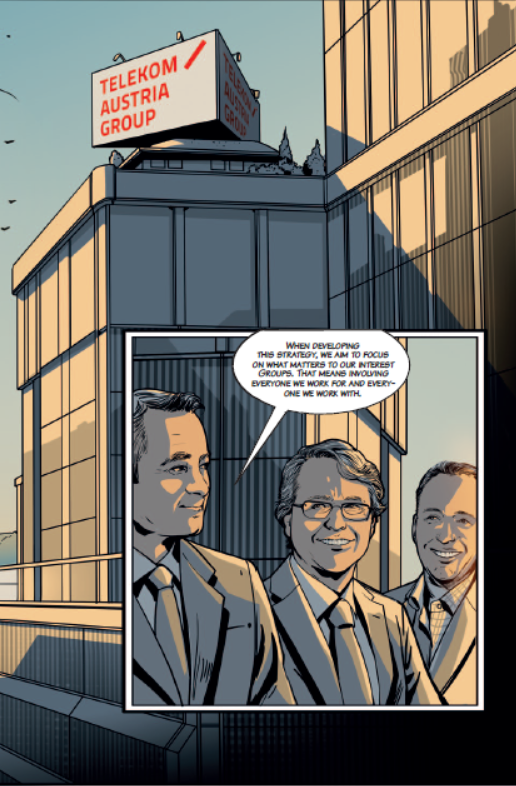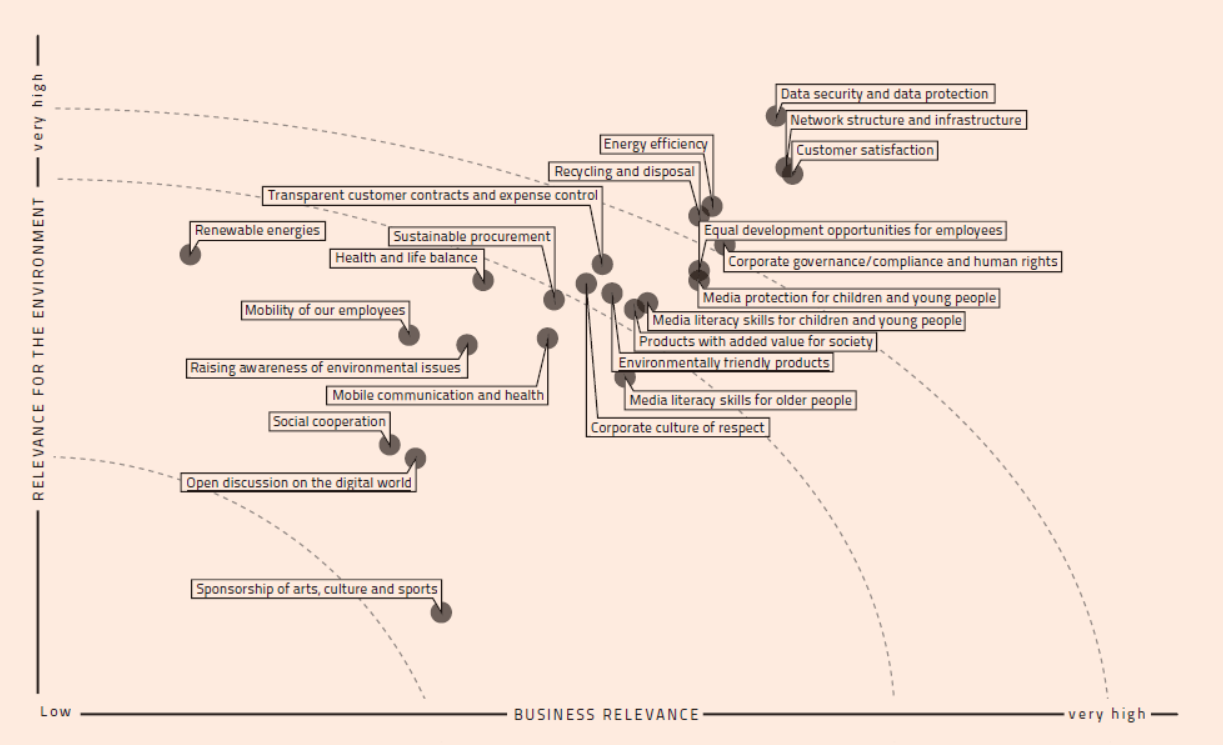Did Telekom Austria change the game with its first G4 report? This post continues my analysis of what changed with G4, this time using Telekom Austria reports over three years.
For an overview of what all this means, see this post.
For a G4 game-changer analysis of Fiat Group, see this post.
For a G4 game-changer analysis of Ahlstrom, see this post.
For a G4 game-changer analysis of Johnson&Johnson, see this post.
For a game-changer analysis of Telekom Austria, read on......
Telekom Austria 2013/2014 Sustainability Report: GRI G4 Comprehensive, 92 pages
Telekom Austria 2012/2013 Sustainability Report. GRI 3.1 A+, 86 pages
Telekom Austria 2011/2012 sustainability Report, GRI 3.1 A+, 58 pages
The first thing that may strike you about Telekom Austria reports, G4 or otherwise, just by looking at the covers, is that they are super-creative. I can't understand how I missed the 2012 report - The Sustainables! - brilliant. Disclosing your sustainability impacts in the form of a Marvell-style SuperHero comic book is a fantastic way to get people interested in your report. It certainly captured my attention.
I was dazzled by Telekom Austria's 2012 report and had to look back at previous years' reports as well. There is definitely a creative flair to sustainability reporting at Telekom Austria that is one of the best I have seen and is consistent over the years. But it's more than just a creative design or infographic. It seems to stem from deep thought about what sustainability means to Telekom Austria. Each report tells a real story of sustainability practice using an imaginative and innovative approach that, each year, is slightly different and reflects the current report theme well. I like it!
The report is hyper-linked throughout - and all GRI G4 disclosures and indicators are annotated in the narrative and linked to the GRI Content Index, making it easy to find what's where. Telekom Austria refers to its report as a "magazine", and, although the framework is GRI and G4, it really does read like a magazine with very interesting articles and background information to add perspective and context.
The report is hyper-linked throughout - and all GRI G4 disclosures and indicators are annotated in the narrative and linked to the GRI Content Index, making it easy to find what's where. Telekom Austria refers to its report as a "magazine", and, although the framework is GRI and G4, it really does read like a magazine with very interesting articles and background information to add perspective and context.
Materiality - drives the report or just for show
Telekom Austria uses its 2012 materiality assessment for its 2013 report. There was no materiality process in 2011.
The 23 material issues are grouped into four sustainability priorities that govern the structure of the 2013 report, just as they did the 2012 Sustainables comic book report.
- Providing responsible products
- Living Green
- Empowering People
- Creating Equal Opportunities
In this report, in general, the four priority themes include the stated material issues. Data protection is the number one issue. In G4, this would be material Aspect "Customer Privacy" with an indicator relating to privacy breaches (G4-PR8). This is covered well in the report narrative and the indicator is reported. Network infrastructure is the second issue and this is mainly correlated to a material Aspect from the draft telecommunications sector supplement. This is reported in the company's annual report, not the sustainability report. Customer satisfaction is the third most important issue, and the response to G4-PR5 (customer survey results) is that there are no results yet as a new survey has just been completed. However, these three top issues appear to be addressed appropriately in the report.
This is not the case with the lesser issues. The least important material issue is noted as "sponsorship of arts, culture and sports". This is not correlated to any G4 material Aspect in the Telekom Austria report. We might consider a correlation to G4-SO1 (programs with local community engagement) but this indicator is not reported. We might consider it to correlate to G4-EC8 - indirect economic impacts. But responses to G4-EC8 in the Telekom Austria report relate to developments in communication technology and products that "make life easier", which have nothing to do with sponsorship. The second least important material issue is "open discussion in the digital world", whatever that means. This is not correlated to any material Aspect and I have no idea whether it's reported or not or how it is measured as I really don't know what it relates to. Therefore, while I think Telekom Austria does a good job of reflecting the material focus in this G4 report (just as it did in the 2012 G3.1 report), covering the main themes and most important issues, there seems to be a lack of rigor in correlating all the material issues to actual performance and impacts within the G4 framework.
Focus - focused and relevant or ticking the boxes
This is a comprehensive level report so there are more boxes to tick than a core report. It's certainly no shorter than the previous two reports and almost double the length of the 2011 report. However, Telekom Austria has not reported on Aspects that were not defined as material. occupational health and safety (social), biodiversity, use of materials, supplier assessments for labor, environmental and social practices, and many aspects of human rights (although it's noted that this is because the data is not available, not because certain human rights indicators are not material). All the indicators in the draft telecommunications sector supplement are reported. Generally, then, it seems that Telekom Austria has made a focused selection, even if the focus is rather broad - 23 material issues is quite a lot.
Engagement - process or lip-service
Telekom Austria doesn't go overboard in describing it's stakeholder engagement process in 2013. It was an online survey of 300 internal and external stakeholders. The results are not disclosed. It's not clear what was asked, who responded, or who said what. It's not clear to what extent the survey results influenced the selection of the issues. It's not clear who made this selection. All of this was described in the 2012 G3 report, and again, almost word for word in the 2013 report. Does an online survey constitute stakeholder engagement? Well, there are surveys and surveys. However, my personal view is that there is no substitute for a good 'ole conversation. I believe there is room for more robust activity in this area.
Integrity - shapes up or misleads
I think this report does a good job of reporting the indicators that the company has selected to report. In each section, there is a hyper-linked disclosure or performance indicator that shows you where the commentary fits in the G4 Content Index. And for people like me, there's a treat. They say flattery will get you everywhere, and Telekom Austria knows how to make us GRI geeks feel special. In each section there is a catch-all for indicators not reported in the narrative, specially created for "GRI Experts". Thank you, Telekom Austria, for your consideration.
Impact - what we did or what difference we made
It's a little hard to distill actual impact in Telekom Austria's report. The amount of context and interesting background information enables you to understand why they are doing what they are doing. That gives great perspective on what's needed in society. Telekom Austria's "Creating equal opportunities" focus area has the potential to impact society in the broadest way, reflecting a sort of social mission, which is of course hard to quantify. In this section, Telekom Austria refers to programs to promote media literacy, inform about internet safety, support social entrepreneurs etc. In general, this is about Telekom Austria supporting, initiating, expanding, publishing, implementing, developing, increasing and simply doing more. It's all good stuff, but, beyond a couple of areas where the number of beneficiaries or participants is noted, I didn't get a sense of how all of this is making a difference.
Telekom Austria publishes a separate status of performance against targets for all its subsidiary companies called the "Measures Programme". Here too, although this is fabulous from a transparency standpoint, I was not able to discern any direct measurement of impact (as opposed to reach).
It would be nice to see Telekom Austria use its amazingly innovative and creative capabilities to develop some measures that go beyond participation. Although Woody Allen is noted for saying "80% of success is showing up", I wonder if providing 100,000 people with media skills training actually means that 100,000 people actually become more media literate. Maybe I am just a skeptic.
Game-changer - does or doesn't?
This report isn't really a G4 game-changer for Telekom Austria, interesting though it is. The company moved to materiality-oriented reporting in 2012. In the conversion to G4, aside from changing the numbers of the disclosures and performance indicators, there is nothing too new. In fact, there is not enough new, and the specific requirements of disclosure of stakeholder feedback and engagement process, alignment of material priorities to G4 material Aspects, identification of material Aspect boundaries and performance indicators in line with material issues - none of this is truly present in 2013. Despite such an engaging approach to telling the story, I feel the 2013 report adapts the mechanics of reporting to G4 rather than truly providing a step-up in Telekom Austria's reporting approach. But, as with my analysis of Johnson and Johnson's G4 reporting, the path to G4 was already paved a year in advance with a more strategic approach including a materiality process and report face-lift in 2012.
I give this report a 67% rating, the best so far, but not good enough to really change the game at G4 level.
Focus - 70%
Stakeholder Engagement - 45%
Integrity - 75%
Doing or impacting - 65%
This completes four game-changer analyses. Watch this space soon for a summary-so-far of trends and insights. And then, maybe some more analyses.
elaine cohen, CSR consultant, Sustainability Reporter, HR Professional, Ice Cream Addict. Author of Understanding G4: the Concise guide to Next Generation Sustainability Reporting AND Sustainability Reporting for SMEs: Competitive Advantage Through Transparency AND CSR for HR: A necessary partnership for advancing responsible business practices . Contact me via www.twitter.com/elainecohen or via my business website www.b-yond.biz (Beyond Business Ltd, an inspired CSR consulting and Sustainability Reporting firm)
































No comments:
Post a Comment